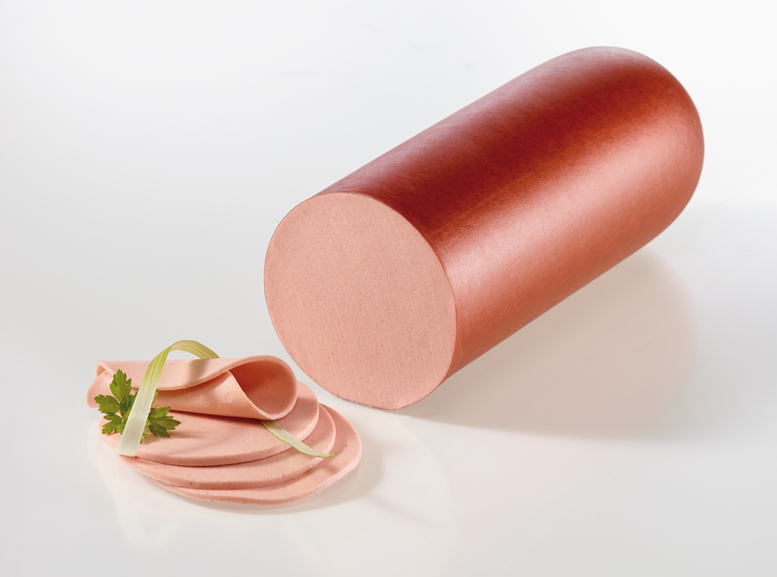Meat-free sausage from mushroom proteins

Van Hees and the University of Gießen develop alternative source of protein - Meat-free sausage from fungal proteins. WALLUF. Mushroom proteins are the basis for a vegan sandwich coating that VAN HEES GmbH has developed jointly with the University of Gießen and which should be ready for market in two years at the latest.
"Product development of meat-like products from cocultivated mushroom proteins" was the title of the project, which was dubbed in the daily press with sentences such as "This sausage is a mushroom". It took three years to develop a new raw material as a raw material for human nutrition without meat. The graduate food chemist and master butcher Alexander Stephan from the Wallufer company was not looking for protein-rich meat substitutes - as is often the case in Asia - in insects, but in mushrooms: He found out that not the fruiting body, but her so-called mycelium, which usually growing underground Braid, the same amount of protein as meat supplies. This network in the soil, which forms the fungus, can be grown in the biofermenter, for example on molasses, carrots, onions or apple pomace. The mycelium thus obtained is cleaned, freeze-dried and ground to a powder. After adding natural thickening agents, spices, water and oil, the mass produced can be wrapped in casings and processed to a meat-free bread covering.
During his research, Stephan was funded by the Institute of Food Chemistry and Food Biotechnology at Justus Liebig University Gießen with Prof. Dr. med. Holger Zorn accompanies. Together, they chose from the stem fungus family the side-branch Pleurotus sapidus and the shiitake mushroom Lentinula edodes as suppliers of the raw material mushroom biomass.
The research started three years ago. They were supported by the state of Hesse with 147.000 Euro from the research funding program LOEWE III. When Minister of Science Boris Rhein now personally informed VAN HEES about the project and the Lyons from mushrooms could hardly distinguish between meat and meat from Lyons, he praised the fact that the family-owned company is innovative in the sustainable development of our society. More and more people wanted to eat less meat or no more meat. In addition, meat production consumes much land and water and causes the emission of large quantities of greenhouse gases. Herbal alternatives are therefore in demand.
The company, which produces only meat products - quality additives, spices, herbs, marinades, emulsions and flavors - has long been successfully involved in vegetarian alternatives to meat in sausage products. This area will become even more important. Therefore, following the LOEWE III grant, Alexander Stephan is now building a department for scientific research that will deal, among other things, with edible mushrooms and other protein sources as a meat alternative. Stephan: "We want to make VAN HEES fit for the future." Innovation, research and technical know-how are the basis for this.
Proteins would become increasingly important in the future to feed the rapidly growing world population. You need alternatives to the traditional protein sources such as meat, fish, dairy products, soybeans, eggs or nuts: The overfishing of the oceans and less land for agricultural use have limited food production. In addition, the flexitarian diet of "part-time vegetarians" has established itself as a fixed market segment. VAN HEES sees the protein source of the fungus mycelium distinct advantages over animal protein sources: it contains less fat, no cholesterol, is easy to cultivate and has ethical advantages.
The LOEWE III funding of the state of Hessen made it easier for the team led by Alexander Stephan and Prof. Dr. med. Holger Zorn, to deal intensively with alternative innovations. Among other things, they developed a vegan "bratwurst", vegan "Viennese", vegan "cold cuts", the replacement of soy in the kebab and even the replacement of gluten in bread. For a vegetarian "salami," they simulated the fat with egg white protein, and used Lactobacillus reuteri, a vitamin B12-producing bacterium, to ripen. The shelf life of these products proved to be particularly high, and harmful substances were not found.
2016 prototypes of the vegan sandwich already passed their first test during the IFFA, when 330 tasted critical vegan "cold cuts": 54 percent found his taste acceptable, 14 percent even considered him a traditional sausage. The question "Can we grow mushrooms as meat loaf?" Answered not only the teams of VAN HEES and the University of Gießen with a clear yes.

